 |
 |
|
by Tom Mes [TM], Nicholas Rucka [NR], Jasper Sharp [JS]
A Day On The Planet
Dead End Run
Nightmare
One Missed Call
Tokyo 10+01
A Winter's Day
Zebraman
|
 |
A Day On The Planet
Japanese Title: Kino No Dekigoto
Director: Isao YUKISADA
Cast: Rena TANAKA, Satoshi TSUMABUKI, Ayumi ITO, Shuji KASHIWABARA, Chizuru IKEWAKI
Running time: 110 mins.
Year: 2004
 A group of seven college students, two girls and one boy, meet for a drunken reunion at the house of Masamichi (Kashiwabara) in Kyoto. As the night goes on and the friends become progressively drunker, Maki (Tanaka), girlfriend of Nakazawa (Tsumabuki) decides to open a hairdressing salon in Masamichi's bathroom where she starts cutting the boy's hair, whilst Kate (Ito) makes a play for the shy and studious Kawachi. Meanwhile, news breaks over the TV of a man wedged between two buildings and a whale stranded on a local beach. A group of seven college students, two girls and one boy, meet for a drunken reunion at the house of Masamichi (Kashiwabara) in Kyoto. As the night goes on and the friends become progressively drunker, Maki (Tanaka), girlfriend of Nakazawa (Tsumabuki) decides to open a hairdressing salon in Masamichi's bathroom where she starts cutting the boy's hair, whilst Kate (Ito) makes a play for the shy and studious Kawachi. Meanwhile, news breaks over the TV of a man wedged between two buildings and a whale stranded on a local beach.
The central conceit of Yukisada's frothy teen-pleaser is that the small mundane, fleeting moments that occur on a day-to-day basis in the world around us are major, climactic events for those immediately involved. Unfortunately the lack of discipline to the script renders the end results as little more than a twee and inconsequential time-waster from the Shunji Iwai school of hipness. The Big Chill this ain't. As a character study, it suffers from highly-affected, overly "cute" performances, especially from the two girls, and a distinct lack of purpose. There's the odd whimsical moment, but these are few and far between, and it's hard to believe that the same director was the force behind the acerbic Go just a few years earlier.
[JS]
|
 |
Dead End Run
Original Title: Dead End Run
Director: Sogo ISHII
Cast: Yusuke ISEYA, Masatoshi NAGASE, Tadanobu ASANO, Robert Harris, Miwako ICHIKAWA
Running time: 57 mins.
Year: 2003
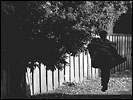 After having a large role in the demise of Takenori Sento's Suncent production company with the costly box office flops Gojoe and Electric Dragon 80,000 V, it was anyone's guess what the future would hold for Sogo Ishii. Obstinate as ever, he simply continued where he left off, following up the assault on the senses that was Electric Dragon with an even more experimental work. After having a large role in the demise of Takenori Sento's Suncent production company with the costly box office flops Gojoe and Electric Dragon 80,000 V, it was anyone's guess what the future would hold for Sogo Ishii. Obstinate as ever, he simply continued where he left off, following up the assault on the senses that was Electric Dragon with an even more experimental work.
Dead End Run consists of three different versions of the same scenario: a man is chased through the city streets, only to find himself in a (literal) dead end situation where he has no choice but to face his pursuers. There is little more to each story than this, the script unfortunately not having evolved further than the idea stage. The artificially protracted resolutions of the first two segments are completely unsatisfactory (the turn into musical with a Björk lookalike in the opening episode is even risible), with only the Asano sequence showing an ounce of inventiveness. The only saving grace here is the film's incredible sound design, utilising a 16-channel (!) sound system that makes the viewer feel like a pinball ricocheting inside a maze of sounds. As in the case of Electric Dragon however, the impact of the sound will be greatly diminished on the small screen.
[TM]
|
 |
Nightmare
Original title: Nagai Yume
Director: HIGUCHINSKY
Cast: Masami HORIUCHI, Shuji KASHIWABARA, TSUGUMI, Eriko HATSUNE, Kenjiro TSUDA
Running time: 58 mins.
Year: 2000
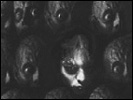 After being pleasantly impressed with director Higuchinsky's 2000 cinematic eye and brain twister Uzumaki, I had some questions about whether he was actually capable of delivering a compelling narrative without resorting to a bag of music video devices. Now that I have watched some of Higuchinsky's direct to video releases (which, as I understand it, is where he primarily resides), I have to say that I have dwindling faith in him.
Based on a manga by Uzumaki's Junji Ito, Nightmare is the story of a psychologist at a mental hospital who is perplexed by his newest patient and his ailment. While the patient sleeps, it seems, his dreams span longer and longer stretches of time during which he actually ages in the real world. This
continues until the patient begins to evolve into the next evolutionary stages of humankind. (A reverse Altered States?) When the psychologist´s assistant complains that his own patient, a young woman with some anxiety issues, is being haunted at night by the 'Long Dream' patient, the two psychologists begin taking the 'Long Dream' claims more seriously.
This video was clearly a small production. The cast is tiny, the action is primarily limited to one location, and the visual effects are simple. Notwithstanding this the HD photography looks pretty good, though the lighting designs are more high school drama club than corresponding to any semblance of logic or style. Higuchinsky's over-reliance on trick photography - in fact, an obsessive use of the old 'Dolly out, Zoom in' trick - is tiresome. In so far as the story is concerned, there aren't enough original ideas and clever concepts to support its hour length and specifically the
ending, although fairly nicely delivered, is not the revelation that I think the filmmakers planned for. These issues coupled with the lack of clear direction for the actors and a horrid soundtrack made me wonder why I was watching it. After being pleasantly impressed with director Higuchinsky's 2000 cinematic eye and brain twister Uzumaki, I had some questions about whether he was actually capable of delivering a compelling narrative without resorting to a bag of music video devices. Now that I have watched some of Higuchinsky's direct to video releases (which, as I understand it, is where he primarily resides), I have to say that I have dwindling faith in him.
Based on a manga by Uzumaki's Junji Ito, Nightmare is the story of a psychologist at a mental hospital who is perplexed by his newest patient and his ailment. While the patient sleeps, it seems, his dreams span longer and longer stretches of time during which he actually ages in the real world. This
continues until the patient begins to evolve into the next evolutionary stages of humankind. (A reverse Altered States?) When the psychologist´s assistant complains that his own patient, a young woman with some anxiety issues, is being haunted at night by the 'Long Dream' patient, the two psychologists begin taking the 'Long Dream' claims more seriously.
This video was clearly a small production. The cast is tiny, the action is primarily limited to one location, and the visual effects are simple. Notwithstanding this the HD photography looks pretty good, though the lighting designs are more high school drama club than corresponding to any semblance of logic or style. Higuchinsky's over-reliance on trick photography - in fact, an obsessive use of the old 'Dolly out, Zoom in' trick - is tiresome. In so far as the story is concerned, there aren't enough original ideas and clever concepts to support its hour length and specifically the
ending, although fairly nicely delivered, is not the revelation that I think the filmmakers planned for. These issues coupled with the lack of clear direction for the actors and a horrid soundtrack made me wonder why I was watching it.
[NR]
|
 |
One Missed Call
Original title: Chakushin Ari
Alternative title: You've Got a Call
Director: Takashi MIIKE
Cast: Ko SHIBASAKI, Shinichi TSUTSUMI, Goro KISHITANI, Kazue FUKIISHI
Running time: 115 mins.
Year: 2003
 Takashi Miike's entry in Kadokawa's traditional New Year's horror cycle, which was once kicked off by The Ring, is an uninspired scare story that goes through the motions for most of its running time. The premise is a tired rewrite of the Ring formula: a group of students receive voice messages on their mobile phones, messages that are recordings of their own imminent deaths. And the date for each message is only a few days in the future... Takashi Miike's entry in Kadokawa's traditional New Year's horror cycle, which was once kicked off by The Ring, is an uninspired scare story that goes through the motions for most of its running time. The premise is a tired rewrite of the Ring formula: a group of students receive voice messages on their mobile phones, messages that are recordings of their own imminent deaths. And the date for each message is only a few days in the future...
Miike does little with the material at hand. Though unambitious, the premise certainly allows room for an investigation in the omnipresence of mobile phones in our lives. Its potential for a critical look at the impact of technology is certainly no less than Kiyoshi Kurosawa's Pulse, a film much admired by Miike. But the director fails to utilise the potential here, adding nothing to the illogical narrative, the element of the mobile phone never becoming more than a gimmick.
There are some effective horror sequences here, particularly a lengthy scene set in a dilapidated hospital, but on the whole this is a case of too little, too late and too lazy. Tsutsumi, so good in Sabu's films, is completely wasted here in a role that requires him to do little more than run after Shibasaki.
[TM]
|
 |
Tokyo 10+01
Original title: Tokyo 10+01
Director: HIGUCHINSKY
Cast: EDDIE, Natsuko KATO, Masanobu ANDO, Eisuke SHINOI
Running time: 70 mins.
Year: 2002
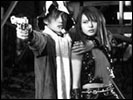 Tokyo 10+01, or Tokyo Eleven, is another uninspired Higuchinsky entry. This time, however, it's a Battle Royale knock-off. Set in the future, 11 convicts, each with a unique outfit and special criminal skill (like Batman!), have been kidnapped by an über-criminal mastermind and are forced into a game of survival over the next 11 hours where they must eliminate their opponents, with the last one standing being the winner. Not too much else occurs and the action unfolds precisely as one would imagine, with the one unexpected scene having an obese man out-sprinting all of his svelte competitors. Tokyo 10+01, or Tokyo Eleven, is another uninspired Higuchinsky entry. This time, however, it's a Battle Royale knock-off. Set in the future, 11 convicts, each with a unique outfit and special criminal skill (like Batman!), have been kidnapped by an über-criminal mastermind and are forced into a game of survival over the next 11 hours where they must eliminate their opponents, with the last one standing being the winner. Not too much else occurs and the action unfolds precisely as one would imagine, with the one unexpected scene having an obese man out-sprinting all of his svelte competitors.
Visually the film is unsatisfactory in all senses. The camera work is bland, the lighting is bad, and the costumes look like wardrobe leftovers. Not to mention the performances... Sadly, there's nothing positive to comment on. Clocking in at 70 minutes, the fast forward button is your friend.
As a final note, I went back and watched Uzumaki again just to see if I had, maybe, been wrong about the film to begin with. Nope, it's still good. So the only conclusion I can make is that either Higuchinsky needs to work with a larger budget that can accommodate the technicality of his vision or that Uzumaki was a fluke and he needs to focus on his storytelling. Until there's an answer to this question, it would be best to avoid both Tokyo 10+01 and Nightmare.
[NR]
|
 |
A Winter's Day
Original title: Fuyu No Hi
Director: Kihachiro KAWAMOTO
Cast: n/a
Running time: 40 / 100 mins.
Year: 2003
Website: http://www.fuyunohi.com
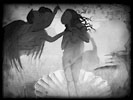 An extraordinary project helmed by stop-motion doll animator Kawamoto in which an eclectic selection of 35 of the most interesting animators from both Japan and other countries join forces to contribute a one to two-minute long visual riff on a two-line couplet from a renku poem by the celebrated haiku poet Matsuo Basho (1644-1694). An extraordinary project helmed by stop-motion doll animator Kawamoto in which an eclectic selection of 35 of the most interesting animators from both Japan and other countries join forces to contribute a one to two-minute long visual riff on a two-line couplet from a renku poem by the celebrated haiku poet Matsuo Basho (1644-1694).
The link between each of the segments is only thematic, but even given the wide diversity of approaches on display, from claymation, pencil sketch, collage, and 3D CGI, there is a certain unity of style. Alongside characteristically impressive sequences from the Russian Yuri Norstein, Oscar-nominated Koji "Mt Head" Yamamura, Ghibli's Isao Takahata (of Pompoko fame) and the master Kawamoto himself, the lesser known artists provide several welcome surprises: Reiko Yokosuka's haunting swirling charcoal drawings, the humorous simplicity of Mark Baker's wood-chopping segment, the sheer artistry of Alexandre Petrov, and Natsuo Shimamura's dazzling apocalyptic vision.
A Winter's Day is a stunning affirmation that Japan still boasts the finest animation in the world, and that it does so not only due to a rich visual tradition all of its own, but through an openness to assimilate styles and aesthetic approaches from a broad and diverse range of practitioners spread over the globe. Though only forty minutes long, an in-depth "making of" featurette detailing the genesis and realisation of the project is included on the DVD that was released simultaneously with the film's limited theatrical run at the end of 2003, boosting the running time up to 100 minutes.
[JS]
|
 |
Zebraman
Original title: Zeburaaman
Director: Takashi MIIKE
Cast: Sho AIKAWA, Kyoka SUZUKI, Atsuro WATABE, Ren OSUGI
Running time: 115 mins.
Year: 2004
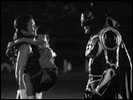 Ultraman beware, Takashi Miike has embraced the Japanese superhero genre. Zebraman is the story of nerdy school teacher Ichikawa (Aikawa) whose only hobby is his obsession with the TV series Zebraman, which ran for a paltry seven episodes in his youth. While his family is falling apart around him, Ichikawa sews together his own Zebraman suit, which one day he decides to put on for a night time stroll. As the city's crime rate mysteriously skyrockets, Ichikawa finds himself face-to-face with a range of bizarre extraterrestrial villains and discovers some hidden powers of his own. Ultraman beware, Takashi Miike has embraced the Japanese superhero genre. Zebraman is the story of nerdy school teacher Ichikawa (Aikawa) whose only hobby is his obsession with the TV series Zebraman, which ran for a paltry seven episodes in his youth. While his family is falling apart around him, Ichikawa sews together his own Zebraman suit, which one day he decides to put on for a night time stroll. As the city's crime rate mysteriously skyrockets, Ichikawa finds himself face-to-face with a range of bizarre extraterrestrial villains and discovers some hidden powers of his own.
Scripted by golden boy Kankuro Kudo (Go, Ping Pong, Iden & Tity), Zebraman makes little effort in its plot to stray from the beaten path of melodrama, containing a degree of sentimentality that is rather uncharacteristic of Miike's work as a whole, but all the more characteristic of his two earlier attempts at making inoffensive family entertainment: the girl band vehicle Andromedia and the manga adaptation Salaryman Kintaro. Compared to these two it's certainly the director's most successful attempt at reaching a bigger audience, but in broader terms, and especially coming on the heels of the disappointing One Missed Call, it's all rather average, with plenty of funny scenes and a couple of effective performances balanced out by too much sentimental pondering.
[TM] |